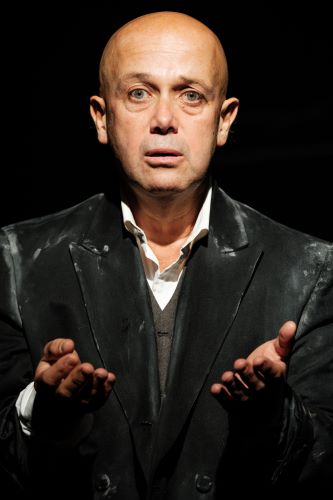
Malenky Theatre brings a mystery to vivid life in their new production Shapira. Every aspect of this play is intriguing, from its protagonist, the antiquities dealer and master forger Moses Wilhelm Shapira, to its author, Karol Sidon, who is the Chief Rabbi of Czech Republic. The theatre’s artistic director Michael Teplitsky has created a mesmerizing work, an archeological thriller that is a sensitive and moving drama revolving around an enigma of a man, Moses Shapira, and his relationships with the women in his life – his wife Roseta, and his two daughters Myriam and Hannah. Although the play is centered on real characters and actual events, it is written and performed with a creative freedom that rather than chronologically plodding through facts, dances in the imagination to reveal inner truths. In Malenky’s Shapira one experiences the art of theatre in every way – outstanding performances by the actors augment an excellent play, with meticulous attention to detail in costumes, set, and lighting.
A hundred and forty years after he shot himself in the head in Rotterdam, Shapira’s final discovery – leather strips found near the Dead Sea, whose text suggest a different version of Deuteronomy – remains shrouded in controversy. The play moves through different times and locations, with the mystery of the scrolls at its center. Shapira’s life and character, as depicted in the play, are replete with contradictions. Did he make an authentic archeological discovery or was he a wily, accomplished, forger? A devoted, loving father and spouse, or was he irresponsibly selfish, deluded by visions of grandeur? Dudu Niv knows how to create an appealing scoundrel, and he does it here to perfection, portraying Shapira with all his contradictions and complexities, in a nuanced, mercurial performance that reveals the tremendous appeal of Shapira’s charisma, as well as his slick maneuvers, feisty temper, and ultimately, his vulnerability. Niv’s vast emotional range, the energy he radiates onstage, and razor-sharp shifts from one extreme to another, imbue the character with a mixture of unpredictability and charm. One is swept away by this Shapira, admiring his style even as one doubts the veracity of his words.

One of the many strengths of this play is that Shapira’s incredible story is told in part through the women in his life, offering different perspectives on this elusive character. Born in Europe around 1830, Shapira emigrated to Ottoman Palestine, and converted to Christianity, marrying the German-born Roseta Jöckel. He opened a store in Jerusalem where he sold antiquities to tourists, some of questionable provenance. The couple had two daughters, Hannah, who perished in Birkenau, and Myriam Harry, who was to become an acclaimed author in France. Shapira’s first claim to fame was the sale of Moabite sculptures to the Altes Museum in Berlin in 1870, for a sum which enabled Shapira to purchase Ticho House in Jerusalem. However, French scholar Charles Clermont-Ganneau declared the sculptures to be fake, and they were found to be forgeries. Shapira claimed he had no knowledge of the scam, and continued to do business as an antiquities dealer, yet the shadow of this incident was to prove long and ominous.
The play opens long after Shapira’s suicide, when his daughter Myriam is an elderly woman and well-known journalist and author. Yelena Yarlova delivers a moving performance as a woman reckoning with her past, reflecting on her relationship with her father, mother, and sister, as long-repressed questions and feelings awaken within her. The set includes an installation of fragmented glass in the background, a visual reference that can take on so many meanings – the veil through which one sees reality, the blurred images of memory, the image distorted, broken and splintered. On the side are high-backed chairs that suggest seats of judgement, as characters sit on the sidelines, watching while a scene plays out before them. The Shapira that appears in the play is a creation of Myriam’s thoughts and memories, yet at the same time he is intensely present, and insistently alive, although she may deny him, he will not relinquish his hold on her. As the past comes to life onstage, Yarlova embodies the young Myriam in Jerusalem with a lively presence and sweet innocence, all those without altering any external aspect of the elderly Myriam. Throughout the play, there is a fascinating, ongoing, conversation within Myriam, between past and present.

Shapira’s suicide in 1884 left his wife Roseta and two daughters penniless and shadowed by shame. They were, all three, to live out the consequences of this abandonment in different ways. Natalia Gantman is Roseta, struggling to provide a secure home for her daughters, while coping with the uncertainty of a husband who embraces risk. Gantman depicts the ambivalence of Roseta, who loves Shapira, yet is angered by his recklessness. She knows she is loved by him as well – even in the brief moments together onstage, Niv and Gantman evoke the affection and sensual connection of the couple – yet also knows that he will not change his ways for her sake. Hannah and her narrative contribute an additional dimension to the play, raising the issue of Jewish identity. Shapira converted, it is assumed, to make his path in business easier, without having to deal with the burden of being Jewish. His daughters, born to a German Lutheran mother, are not technically, traditionally Jewish at all. Yet Hannah found her death in Birkenau. Hadas Eyal depicts the trajectory of Hannah’s life with heart-breaking vulnerability, from blissful bride to be, to a destitute woman settling for what little she can get, to a desperate woman clinging to her anger and her delusions.
Yet another perspective on Jewish identity may be found in the character of Professor Christian David Ginsburg, the Biblical scholar, portrayed by Dima Ross. As may be inferred from his name, he too, was formerly a Jew, who converted to Christianity. Yet as he pleads with Shapira to choose a moderation, he does so with he awareness that to the rest of the world, Shapira remains a Jew, with all that implies. However, those implications, for Shapira, are debatable. Ultimately, Ginsburg’s trajectory has its own surprises, and Ross delivers an emotionally-charged performance. In a dual role as an American soldier and Shapira’s nemesis Charles Claremont-Ganneau, is Ori Levanon. The introduction of the soldier is a reminder of the continued interest and controversy surrounding Shapira and the scrolls (Idan Dershowitz published a book on the topic in 2021), and Levanon develops this character in a thought-provoking way, as well as introducing a nice ambivalence in in his embodiment of the arrogant Claremont-Ganneau.
Shapira
By Karol Sidon
Translation: Pierre Pe’er Friedman; Director: Michael Teplitsky; Set Design: Alexander Lisiansky; Music: Evgeny Levitas; Costume Design: Sasha Khakhan; Lighting Design: Misha Chernyavsky, Ina Malkin; Assistant Director: Julia Goland; Video: Stanislav Kaplan; Assistant Costume Design: Andrey Klashnikov; Cast: Yelena Yarlova (Myriam Harry), Dudu Niv (Moses Shapira), Natalia Gantman (Roseta Shapira), Hadas Eyal (Hanna’leh Rohrbach), Dima Ross (Christian David Ginsburg), Ori Levanon (Mordechai White, Charles Claremont-Ganneau)





